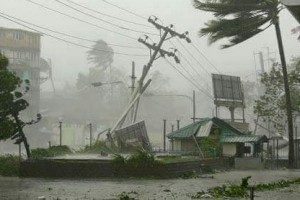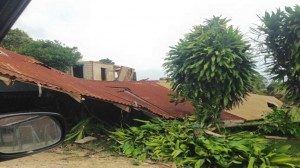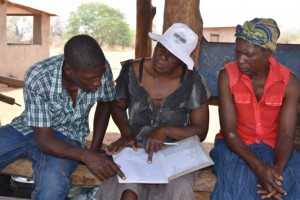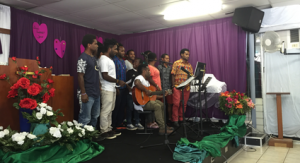Our friends in Fiji are suffering widespread destruction in the aftermath of Tropical Cyclone Winston, which hit on Saturday 20th Feb. Donate Now
Update: 04 March
It has now been confirmed almost 350,000 people were affected by cyclone Winston.
120,000 people are estimated to need urgent humanitarian shelter assistance, over 54, 700 people are still sheltering in evacuation centres and in the hardest hit areas, up to 90 per cent of structures are destroyed.
The north and north western coast of Viti Levu, the south coast of Vanua Levu and some communities in the East and Central Regions have been particularly hard hit. Two villages on Koro Island have been completely destroyed. 42 people have been confirmed dead and some 135 are reported as injured. More than 62,000 displaced people (approx. 14% of the population) are currently sheltering in nearly 900 evacuation centres. Aid, including food rations, is arriving in cyclone affected communities and assessments are now underway across the country.
Methodist Church in Fiji and UnitingWorld’s Response
26 out of the 57 divisions our partner church covers have been badly affected. Complementing the Government of Fiji’s disaster response, the Methodist Church in Fiji will provide clothes, bedding and kitchen cooking/eating utensils.
In some locations it will also provide some food and water purification tablets. Cooking utensils are very important because they are needed for preparing the type of food that is distributed in emergencies and for purifying potentially contaminated water. The Church will provide relief to all community members in areas where it has congregations that are not already receiving relief from other local civil society or non-government organisations. The town of Ba is an example where the MCIF has a significant presence but the relief effort is already being looked after by other agencies. The MCIF will also ensure that vulnerable households (such as those headed by women or with disabled members) are prioritised.
Supplies of the materials our church partner intends to contribute to the relief effort are all obtainable in Suva and Nadi which were not in TC Winston’s direct path. This strategy helps to buoy the local economy, sustaining the livelihoods of local people.
Our church partner is seeking financial support from UnitingWorld to purchase all of these items. Longer term, funds raised will be used to rebuild schools – using a ‘build back better approach’’ to ensure the safety of people in the future. Our church partner has also requested psychosocial counselling and training for a core group of pastors in the worst affected areas.
Please give your most generous gift today.
Call UnitingWorld on 1800 998 122 or click here to donate to our Emergency Contingency Fund.
Funds raised for this appeal will be used to provide immediate humanitarian relief for affected communities and assistance over the longer term. Any excess funds will be held in our Emergency Contingency Fund and used to respond to future emergencies in the region. All donations are gratefully received. Donations $2 and over are tax deductible. Please click here to read our Privacy Policy.
Update: 25 February
Yesterday, our partner the Methodist Church in Fiji formed a Disaster Response Committee to lead the Church’s response to the humanitarian crisis. They report that thousands of homes have been destroyed, tens of thousands of people made destitute and are without food, shelter or clothing. Schools and buildings are reduced to rubble. The death toll has now risen to 42.
 The committee, which is made up of key leaders from the church’s i-Taukei-speaking, English and Hindi-speaking divisions and includes leaders from Women’s and Youth fellowships, is assessing the impact of Tropical Cyclone Winston, developing immediate, short, medium and long-term relief responses and channelling overseas partner support to appropriate church and government relief and resilience programmes.
The committee, which is made up of key leaders from the church’s i-Taukei-speaking, English and Hindi-speaking divisions and includes leaders from Women’s and Youth fellowships, is assessing the impact of Tropical Cyclone Winston, developing immediate, short, medium and long-term relief responses and channelling overseas partner support to appropriate church and government relief and resilience programmes.
Immediate Assistance from the National Disaster Management Office includes distributing:
Food Rations, Water, Shelter, Sanitation, Accessibility for all affected people.
In response to gap analysis clothes, bedding, sleeping mats, cooking utensils, Kerosene Stoves and Lanterns and crops for replanting are being distributed.
Please keep our partners and the people of Fiji in your prayers. To donate to our Fiji Emergency Appeal and support the response efforts of our partners, please call UnitingWorld on 1800 998 122 or click here to donate to our Emergency Contingency Fund.
All funds raised through this appeal will be used to support our church partner’s relief efforts, including re-establishing schools, replanting crops and livelihoods and ‘building back better’ to safeguard communities against future cyclones.
Please give your most generous gift today.
Funds raised for this appeal will be used to provide immediate humanitarian relief for affected communities and assistance over the longer term. Any excess funds will be held in our Emergency Contingency Fund and used to respond to future emergencies in the region. All donations are gratefully received. Donations $2 and over are tax deductible. Please click here to read our Privacy Policy.
Update: 24 February: Our church partner Rev James Bhagwan has reported this morning that the Methodist Church in Fiji’s disaster response committee is meeting today. Ministers throughout Fiji are reporting back with their disaster assessments and local churches have begun their relief programmes.
29 people are confirmed dead and National Disaster Management Office director Akapusi Tuifagalele said about 14,000 people remain in evacuation centres. Whole villages have been destroyed, particularly on the island of Koro where a relief and assessment ship is being deployed.
UnitingWorld staff member Rev Dr Cliff Bird reports from Suva:
“The destruction has been widespread and very bad. The Lau group of islands, Koro Island, villages on Vanua Levu and their township Savusavu have been hit very badly. Hundreds of homes have been lost, infrastructure damaged, farms, vegetable gardens, livelihoods destroyed. Water and power supply to many areas are still down.”

Photo source looptonga.com and ABC news
Our partner, the Methodist Church in Fiji is the largest denomination in the country, covering an extensive network across 55 districts.
National Director of UnitingWorld Rob Floyd has spoken with President of the Church, Rev Tevita Bainivanua and has offered immediate emergency relief and longer-term disaster recovery.
President Rev Tevita has opened all church buildings for emergency shelter and has directed ministers throughout the country to assess and report on the extent of the damage.
All funds raised through this appeal will be used to support our church partner’s relief efforts, including re-establishing healthcare and schools, replanting crops and livelihoods and ‘building back better’ to safeguard communities against future cyclones.
Please give your most generous gift today.
Call UnitingWorld on 1800 998 122 or click here to donate to our Emergency Contingency Fund.
Funds raised for this appeal will be used to provide immediate humanitarian relief for affected communities and assistance over the longer term. Any excess funds will be held in our Emergency Contingency Fund and used to respond to future emergencies in the region. All donations are gratefully received. Donations $2 and over are tax deductible. Please click here to read our Privacy Policy.



 Over the past two years, UnitingWorld has worked with our partner churches, Indonesia Christian Church (GKI) and Evangelical Church in the Land of Papua (GKI-TP) to form a three-way partnership. The partnership is designed to improve the quality of Christian education in two provinces of Papua and West Papua.
Over the past two years, UnitingWorld has worked with our partner churches, Indonesia Christian Church (GKI) and Evangelical Church in the Land of Papua (GKI-TP) to form a three-way partnership. The partnership is designed to improve the quality of Christian education in two provinces of Papua and West Papua.

 During the Strategic Planning process we reflected on the Partnership between UnitingWorld and MeDRA, a partnership that spans nearly ten years. The Uniting Church in Australia still remains their strongest partner. Just as I’ve reflected on the above anthem, words matter, and the word partnership is not used lightly. UnitingWorld isn’t just a “donor agency” or “funding partner” to MeDRA, but a genuine Partner. And as partners we share together, learn together and walk together in God’s global mission. Each of us has our role to play. UnitingWorld cannot do the work that MeDRA does – not successfully anyway. Working with MeDRA and our other Development Partners allows us, as the Uniting Church in Australia to participate effectively in this global mission. And partnering with UnitingWorld supports MeDRA by enabling professional capacity building, organisational strengthening as well as funding for their vital work on the ground. This work brings opportunity, hope, dignity and love to some of Zimbabwe’s poorest and most vulnerable communities. It’s a true witness to God.
During the Strategic Planning process we reflected on the Partnership between UnitingWorld and MeDRA, a partnership that spans nearly ten years. The Uniting Church in Australia still remains their strongest partner. Just as I’ve reflected on the above anthem, words matter, and the word partnership is not used lightly. UnitingWorld isn’t just a “donor agency” or “funding partner” to MeDRA, but a genuine Partner. And as partners we share together, learn together and walk together in God’s global mission. Each of us has our role to play. UnitingWorld cannot do the work that MeDRA does – not successfully anyway. Working with MeDRA and our other Development Partners allows us, as the Uniting Church in Australia to participate effectively in this global mission. And partnering with UnitingWorld supports MeDRA by enabling professional capacity building, organisational strengthening as well as funding for their vital work on the ground. This work brings opportunity, hope, dignity and love to some of Zimbabwe’s poorest and most vulnerable communities. It’s a true witness to God. But if that wasn’t encouraging enough, here’s the kicker. From the profits that each group makes, some is set aside to reinvest into the business, yet before the remaining profits are shared among the group, some is allocated to support other vulnerable people in their communities – widows, orphans, single mothers, etc. They see this as their social responsibility. They were once the most vulnerable but now they have opportunity, they are building something together, they have discovered their God-given dignity and with that their responsibility to others in their community. It’s hard work, but they embrace it and they do it and they are succeeding in it. And they are paying it forward.
But if that wasn’t encouraging enough, here’s the kicker. From the profits that each group makes, some is set aside to reinvest into the business, yet before the remaining profits are shared among the group, some is allocated to support other vulnerable people in their communities – widows, orphans, single mothers, etc. They see this as their social responsibility. They were once the most vulnerable but now they have opportunity, they are building something together, they have discovered their God-given dignity and with that their responsibility to others in their community. It’s hard work, but they embrace it and they do it and they are succeeding in it. And they are paying it forward.

 You can find out how to SPEAK UP for responsible environmental policies by checking out the work of our partner here in Australia,
You can find out how to SPEAK UP for responsible environmental policies by checking out the work of our partner here in Australia,  The committee, which is made up of key leaders from the church’s i-Taukei-speaking, English and Hindi-speaking divisions and includes leaders from Women’s and Youth fellowships, is assessing the impact of Tropical Cyclone Winston, developing immediate, short, medium and long-term relief responses and channelling overseas partner support to appropriate church and government relief and resilience programmes.
The committee, which is made up of key leaders from the church’s i-Taukei-speaking, English and Hindi-speaking divisions and includes leaders from Women’s and Youth fellowships, is assessing the impact of Tropical Cyclone Winston, developing immediate, short, medium and long-term relief responses and channelling overseas partner support to appropriate church and government relief and resilience programmes.